Heading to the Edinburgh Fringe? A guide for new visitors

If you've read references to 'the Fringe' and 'Edinburgh Festival' but don't know much about the annual Scottish event to which these labels apply, then this is a guide for you.
This article also features some tips on how to get to Scotland and where to stay - hopefully helpful advice for those who are tempted to visit the festival and see some comedy.
What is the Edinburgh Fringe?
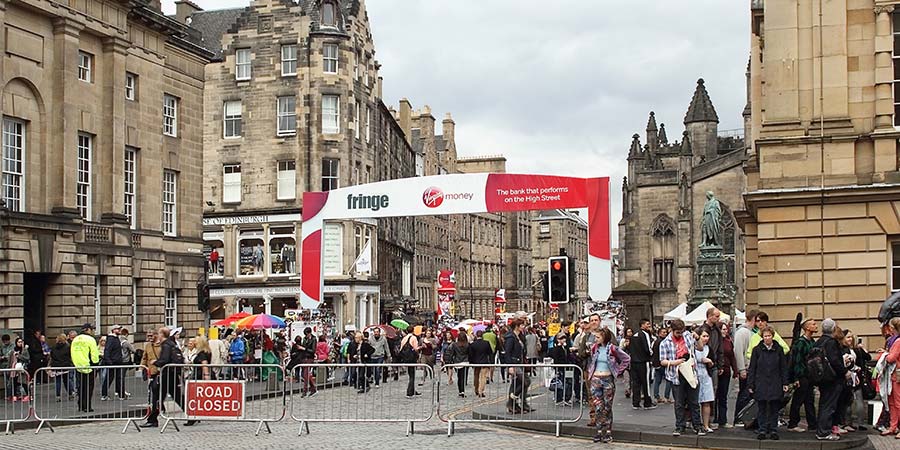
The Edinburgh Festival Fringe (aka 'The Fringe') is the world's largest arts festival. It runs each August in Scotland (in the capital of Edinburgh to be precise). The dates for the 2022 festival are 5th to 29th August, although some shows do actually start and end a few days either side of those official dates.
The Fringe was established in 1947 as a mini-alternative to the stuffy Edinburgh International Festivals (which now comprise all kinds of creative arts, from books to television) - but it has grown to become the most popular of the festivals in the city and, whilst others are only in town for a week or two, the Fringe pretty much takes over the entire city for the whole month of August.
For comedy fans the result is over 1,500 different live comedy shows to choose from. Everything from big theatres to university lecture halls, and the back rooms of pubs to double decker buses are turned into comedy performance spaces during August.
Comedy is everywhere! Stand-up, sketch comedy, comic plays, improv, pantomime, a man just sitting in a gorilla suit for an hour - there really is something for all tastes.
The Festival is open-access, which means anyone can turn up in the city in August to perform (the only thing to really sort is a venue), and thousands of comedians do just that.
It should be noted most of those performing are not 'TV famous' (at least not yet), but that doesn't mean you won't find lots of laughs. In fact you may very well see hilarious comedians who will be the stars of the future. Pretty much every TV panel show comedian performed at the festival before they were famous. You might, admittedly, also see some terrible acts - but it's all part of the experience and so much more 'real' a comic adventure than anything you'll see on TV.

The hidden truth is that a large percentage of the comedians will make a big financial loss performing at the festival... even if they do really well. For example, stand-up Tiernan Douieb explained to us a few years back that, even if he sold every ticket, he'd still have made a £4,500 loss. The reason for this strange accounting is that travel, accommodation, venue and publicity fees outweigh possible ticket revenue.
If some acts are facing a guaranteed loss, why do they still perform? Well, for many the festival atmosphere is addictive - it's a chance to hang out with comedy friends after shows, be adored by the public, and generally have a good time.
The festival is also viewed by many performers as a great way of really honing their act to improve their comedy skills. It doesn't take a genius to understand that performing the same show 20+ times in a row can help polish jokes and delivery; pretty much every comedian is a slicker performer at the end of their run.
On top of this though, many media publications, agents, and television and radio producers turn up to the festival, so performing at the Fringe is seen as a way of getting feedback from these groups and perhaps being seen by the right people who can help you develop your career or take it to the 'next level'.
There's also the Edinburgh Comedy Award aiming to pick out the best new comedian. Some acts have indeed fast-tracked onto TV after having been seen at the festival.
However, it should be noted that for every success story, there are dozens more without. In fact Susan Calman told us in a 2012 interview how her first year performing at the festival was the most miserable month of her life; and Michael McIntyre has spoken in the past about how he racked up huge debts at the festival only to be seen by a handful of people. Every year there's talk of the 'bubble bursting', but for now comedians are still turning up in their droves.
So read on for how to get to the festival and how to pick who to see...
Where to see shows...
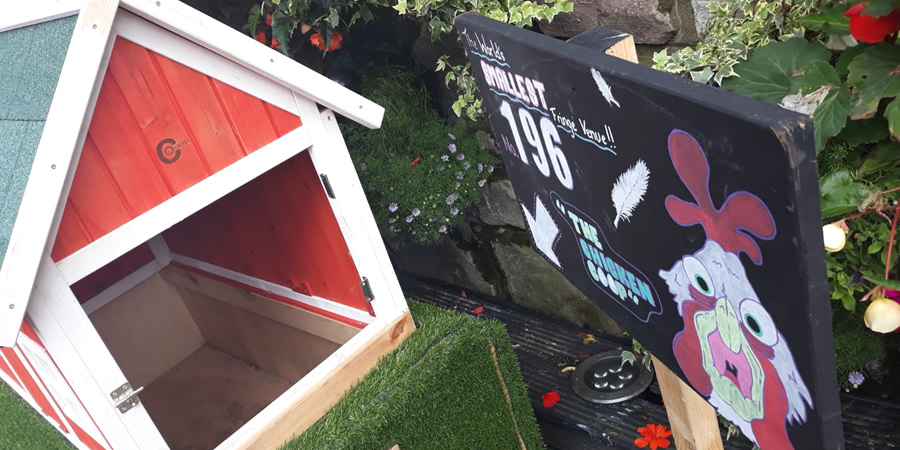
There are venues all around the city running comedy from morning to late at night, with many shows lasting exactly an hour.
A big thick official brochure is released each year, which you can pick up for free when you arrive in the city. However, we'd suggest you ignore this as there's not much detail in it and it's missing a number of shows (comedians have to pay a lot of money to list their show in it, so more and more are not bothering each year). Instead we suggest using the BCG's listings to find a show - of course we're always going to say that, but our listings are genuinely more detailed than the official brochure and packed with additional, constantly updated information such as published reviews, extra show times, and more.
There are two main types of show and venue at the Fringe:
Paid Shows: Typically tickets at 'paid venues' cost around £12 to £15 each, although prices can vary by date and time, with some a little higher and some a little lower than those benchmark figures. The main ticketed comedy venues are The Stand, The Pleasance, The Underbelly, Assembly, The Gilded Balloon, and Just The Tonic - but there are others too.
For really popular shows you should book in advance via the internet (either the venue's website or the official EdFringe.com website); but in the majority of cases you can just turn up shortly before the show and buy at the door or venue box office in the case of bigger venues (we wouldn't suggest leaving less than half an hour though). The less you pre-order the more flexible you can keep your day - we'll talk more about the benefits of that in a moment.
Free Shows: PBH's Free Fringe and The Laughing Horse Free Festival run a large number of venues across the city between them - mainly smaller spaces in the back rooms of pubs and such like. These shows are free to watch, but you are asked to put a donation into a bucket at the end of the show if you enjoyed it.
The average donation is probably about £2 but if you enjoyed the show we'd encourage you to give the comedians a note (a monetary one) - if you think about it, you've had an hour's top entertainment from them. Most have travelled further than their audiences and so have a lot of expenses to pay (including sky-high accommodation costs) just to be in the city to entertain you, so do help them out if you can.
Which shows to see?

This is a hard one to answer - as it all depends on your taste! Have a browse through the listings (use the genre filter) to find comedians or show topics that appeal to you.
It should be noted that competition to get an audience into a show is fierce, so do expect to be bombarded with posters, flyers and press articles during your time in the city! You'll note pretty much every show claims to be a masterpiece and probably has a four or five star quote to back that up. Be wary of all this - there are now so many publications reviewing that it's normally possible for even the most dreadful show to find a good quote or two to put on their poster. They can also use sneaky trickery - for example, there's an infamous story of a comedian turning his terrible one star review into the poster quote 'A Star'.
A far better a way to judge whether a show is good or not is to look at a full cross section of reviews from all the publications together - we do our best to include every review a show gets on our listing for it, allowing you to see what the general opinion is at a glance.
However, don't write off a show that looks interesting due to low- or no-star ratings. As we mentioned, there are thousands of shows being staged, so many simply don't get seen by the critics, or perhaps just seen once on a night with no atmosphere - or a particular show might have got a bad review simply because it wasn't to the reviewer's taste, but it may be to yours! In short, take risks - you might be surprised.
Word of mouth can be a good way of hearing of good shows - whilst you're standing in a queue or at a bar why not ask other people what they enjoyed watching (careful you don't ask venue staff or people flyering though - they'll only plug their own shows!). As the month goes on a certain buzz will build around the best productions - this is a great reason not to book too much in advance, so you can leave time to fit in the un-expected new hit into your schedule.
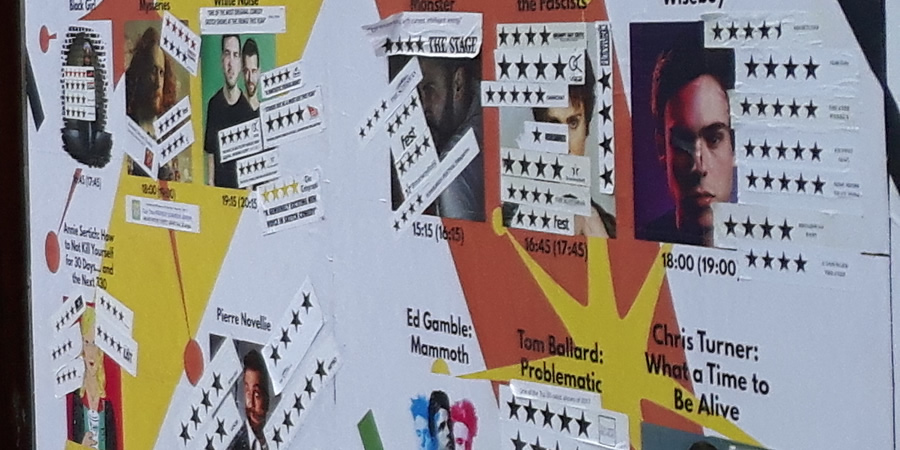
A couple of side notes about your time in the city:
Be aware that Edinburgh is a big place and it's about half an hour's walk between The Stand and Assembly Room venues (in the North) and George Square (in the South, where a few venues are), so don't book tickets for different venues without leaving travel time.
Dress wisely: the venues can get very hot if it's sunny, or you could get soaked if Scotland's weather is deciding to revert to stereotypes. There are lots of hills, slopes, steps and uneven surfaces in the historic city too, so be prepared.
Pace yourself: It can be a long day, so make sure you leave time to eat and drink. The festival is very hustle-and-bustle so maybe take a few hours out.
How to get there...
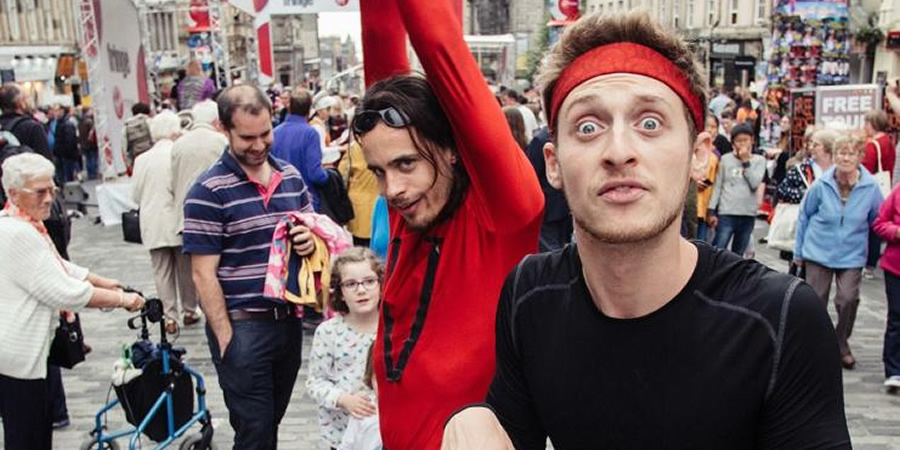
So you're tempted to check out the Edinburgh Festival? Here are your main options for getting there...
Car: With this option you can travel in your own time and with as much luggage as you want. It depends on where you live as to how long this journey is though. From the South it can be a full two days just to get there and back (about 7 hours from London, as a benchmark). A waste of your day? You also need to find somewhere to park - which is harder than it sounds. It seems every street in Edinburgh has double yellow lines or requires a permit.
Train: This is probably the most popular choice, with Edinburgh well connected to the rest of the country by rail. As you're no doubt aware, since privatisation, train tickets are never as reasonably priced as they should be any more, but the further ahead you book the better value they are. There are a number of stations in the city - Edinburgh Waverley station is the largest and busiest, serving both the East and West Coast Main Lines.
Fly: You'd be surprised how cheap this option can be. A return from the south via EasyJet can cost under £80 - sometimes beating the train fares. Obviously there's the faff of getting to an airport and going through security, which is a downside. When you get to Edinburgh Airport catch the bus (or newer tram) into the city centre - it's built for big bags and has free WiFi on board.
Where to stay
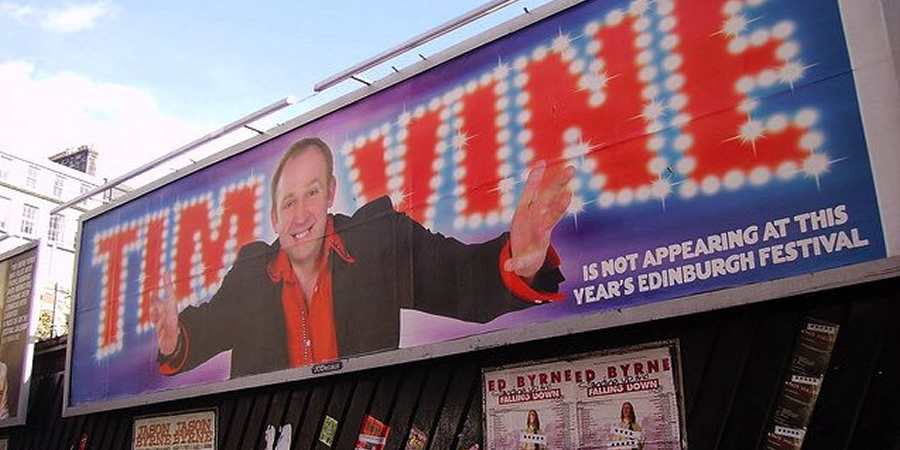
With tens of thousands of extra visitors in the city in August (not to mention the performers), prices for accommodation are sky high. Your accommodation costs will probably be your biggest single outlay.
Here's your main options...
Hostel: This is the cheapest option, but it does mean sleeping in a room with lots of other people. Falling asleep in the same room as strangers doesn't appeal to us, especially given that it's a festival so likely some of your fellow bunkmates will have been drinking. Heavily.
Hotel / Bed & Breakfast: This is the classier way to stay and wake up fresh, but the demand for rooms is very high - so expect to pay more than you would in another city. At the time of writing (in July), a comparison site shows the average price per night is currently over £200.
Rent a spare room / house: A slightly different option is to rent a spare room (or a whole property). Some enterprising residents offer up their spare rooms (or even in some cases go on holiday for the month to leave their home empty). You'll have heard of Airbnb, but the prices are high on there. Gumtree is one of the sites people list their rooms on. Be aware of scams though - there's probably a whole article to be written on what you need to watch out for, but essentially make sure to ask lots of questions in advance and try not to part with any of your money until you have met the tenant via a Zoom call or similar.
Have a fun time!
With any luck you found this guide interesting and useful. If you have any general questions this article didn't help with, do email us and we'll try and add the answers in.
Help British comedy by becoming a BCG Supporter. Donate and join us in preserving, amplifying and investing in comedy of all forms, from the grass roots up. Advertising doesn't cover our costs, so every single donation matters and is put to good use. Thank you.
Love comedy? Find out more